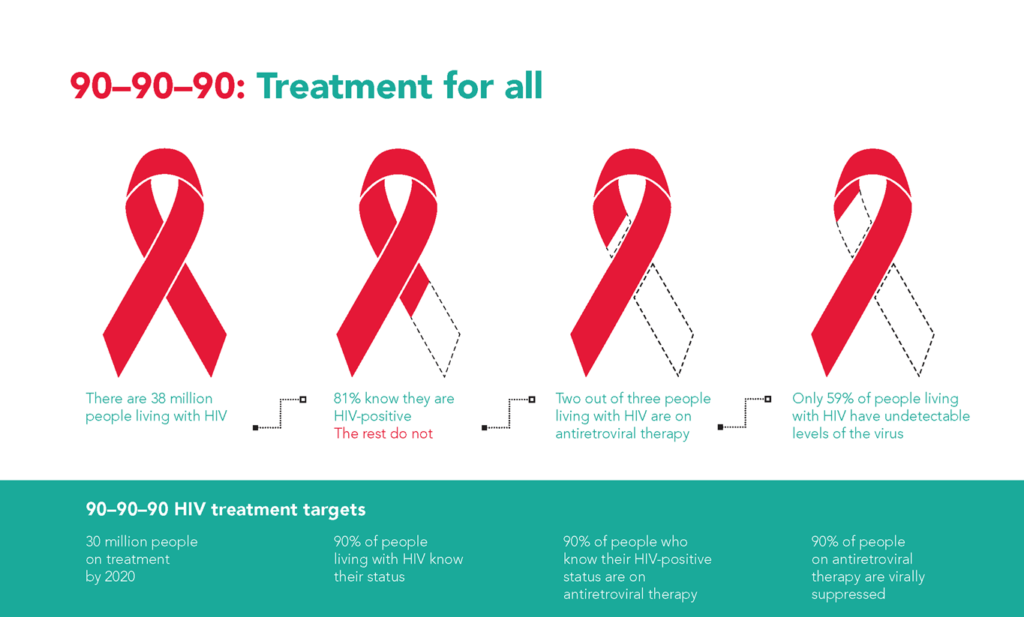
The 75th session of the UN General Assembly is taking place in New York right now, and the COVID19 pandemic is the overwhelming topic of global concern. The UN reminds us, however, that racism, intolerance, inequality, climate change, poverty, hunger, armed conflict, and other ills remain global challenges that must continue to be addressed.
Winnie Byanyima is the Executive Director of UNAids, the division of the UN that is dedicated to leading the global effort to end AIDS as a public health threat by 2030. Byanyima is speaking out on how the novel coronavirus is impacting HIV, and the importance of the global sustainable development goals (SDG.) “To beat #COVID19, beat AIDS and achieve the #globalgoals may seem especially challenging now,” Byanyima said this week. “The answer is not to shift dates or move the goalposts. We also can’t go back to normal because normal was the problem. We must reset.”
One set of goals that does not look like it will be met is the 90-90-90 targets — which aim to bring HIV testing and treatment to those that need it by the end of 2020. The 90-90-90 goals were set in 2016 by the UN General Assembly, and aim to reduce the amount of undetectable HIV in people’s bodies. They specifically aim to ensure that by the end of this year, 90% of all people living with HIV will know their HIV status, 90% of all people with diagnosed HIV infection will receive sustained antiretroviral therapy, and that 90% of all people receiving antiretroviral therapy will have viral suppression.
An update provided by UNAids this week states that while great progress has been made in the last four years, it is unlikely that the 90-90-90 targets will be met this year. “Achieving the 90–90–90 targets results in a minimum of 73% of people living with HIV having suppressed viral loads, so the global target for the end of 2020 is unlikely to be met,” the UNAids progress report states. “Some countries have reported reductions in medicine collections of up to 20% in some areas. There have been multiple reports of people living with HIV not having enough antiretroviral medicine for a lockdown of more than 60 days, as well as reports of people having abandoned their HIV treatment due to a lack of food.”
The report doesn’t specifically attribute not meeting the 90-90-90 goals to COVID-19, though it does suggest that lockdowns and a lack of food are contributing to the problem. The report warns that ‘early modeling showed that a severe disruption in HIV treatment could result in additional AIDS-related deaths in sub-Saharan Africa.’ As of now, however, countries are not reporting a decrease in people receiving treatment for HIV. “Monthly data from January to June 2020 reported by countries to UNAIDS have not shown substantial declines in the numbers of people currently on treatment over the six-month period,” the update states.
The good news is that globally, there have been ‘remarkable gains across the HIV testing and treatment cascade.’ UNAids reports that “at the end of 2019, 81% of people living with HIV knew their HIV status, and more than two thirds (67%) were on antiretroviral therapy, equal to an estimated 25.4 million of the 38.0 million people living with HIV—a number that has more than tripled since 2010.”
The delta between current levels of suppressed viral loads in people living with HIV globally (59% in 2019) and the benchmark of 75%, is closing. “Gains in treatment effectiveness, as well as increases in the number of people who know their status and are on treatment, are reflected in the fact that viral load suppression levels among all people living with HIV increased by 18 percentage points between 2015 and 2019.”
